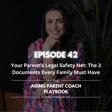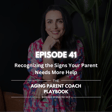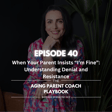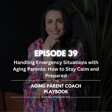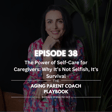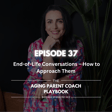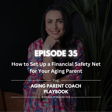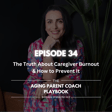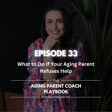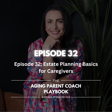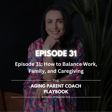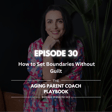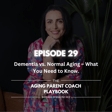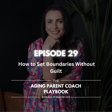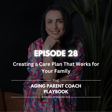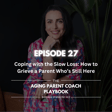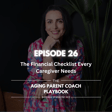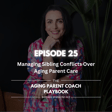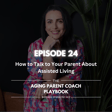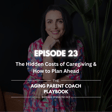Become a Creator today!Start creating today - Share your story with the world!
Start for free
00:00:00
00:00:01

Episode 36: Finding the Right In-Home Caregiver for Your Parent
Finding the right in-home caregiver can feel overwhelming—but it doesn’t have to be.
In this episode, I walk you through how to determine what level of care your parent truly needs, what questions to ask when hiring (whether through an agency or independently), and the most common mistakes families make during the process. You’ll walk away with practical tools and more confidence to make the right decision the first time—for both your parent’s well-being and your own peace of mind.
🎧 Learn more or book a free consultation at www.theagingparentcoach.com
Transcript
Introduction to In-Home Caregiving for Aging Parents
00:00:00
Speaker
Hey there, and welcome back to the Aging Parent Playbook. I'm Dr. Barbara Sparacino, geriatric psychiatrist, caregiver coach, and your partner navigating the ups, downs, and all the way sideways moments of caring for an aging parent.
00:00:14
Speaker
Today, we're digging into one of the most important and most stressful decisions many adult children face, finding the right in-home caregiver for your parent.
Recognizing When More Help is Needed
00:00:26
Speaker
Look, maybe you've reached a point where your parent needs more help,
00:00:29
Speaker
than you can provide. Maybe you're running yourself ragged trying to juggle it all. Or maybe you're overwhelmed by the idea of inviting a stranger into your parent's home.
00:00:43
Speaker
I hear these all the time in my coaching sessions. And today i want to help you feel more confident and equipped.
00:00:53
Speaker
By the end of this episode, you'll know
00:00:59
Speaker
How to determine what level of care your parent needs.
Types of Caregivers and Assessing Needs
00:01:05
Speaker
What questions to ask before hiring a caregiver. Common hiring mistakes to avoid so you can make the right call the first time.
00:01:16
Speaker
Let's dive in.
00:01:22
Speaker
What type of care does your parent actually need? Here's the thing. Not all caregivers do the same thing. And if you don't get clear on what kind of help your parent needs, you're going to waste time, money, and emotional energy.
00:01:39
Speaker
So let's break it down. First, we have companion care. This is for parents who are mostly dependent, but may be lonely or need light help. Companion caregivers provide socialization, light housekeeping, help with errands, and simple meal prep.
00:01:56
Speaker
Think of them as a supportive presence to reduce isolation and encourage routine. Then we have personal care aids, PCAs. These caregivers help with activities of daily living, such as bathing, dressing, toileting, grooming, mobility, and basic medication.
00:02:15
Speaker
Reminders, they don't perform medical tasks, but they're essential when your parent can no longer safely manage these basics on their own. Then we have skilled nursing or home health as aids, HHAs. This level involves medical care, wound dressing, vital sign monitoring, injections, or dementia behavior management.
00:02:39
Speaker
If your parent has a chronic medical condition, recently had surgery, or is living with cognitive impairment, this may be necessary.
00:02:48
Speaker
You can think of these categories as a kind of staircase. start with the least invasive and move up based on need.
00:03:01
Speaker
Quick tip. If you're not sure what level of care your parent needs, talk to their physician or book a care assessment through a home health agency.
Hiring a Caregiver: Questions and Trust
00:03:15
Speaker
Many offer these for free or for a small fee.
00:03:26
Speaker
What to ask when hiring a caregiver. Okay, so now you know what kind of caregiver your parent needs. But how do you find the right person? Whether you're hiring independently or going through an agency, don't skip this part.
00:03:44
Speaker
The wrong fit can disrupt your parents routine, strain your relationship and lead to burnout fast. Here are some things, some essential questions to ask.
00:03:58
Speaker
If hiring directly, what is your experience working with seniors? Have you received any training in dementia care or mobility assistance?
00:04:10
Speaker
Are you CPR certified? Can you share references from families you've worked with? Are you comfortable assisting with toileting, bathing or transferring if needed?
00:04:22
Speaker
if going through an agency? Do you conduct background checks and drug screenings? How do you match caregivers to families? What's your policy if a caregiver is sick or doesn't show up?
00:04:37
Speaker
Can we meet the caregiver beforehand or request a trial shift?
Avoiding Common Hiring Mistakes
00:04:43
Speaker
And I'll add this, don't ignore your intuition. Sometimes everything looks great on paper, but something just feels off during the interview. Trust that feeling.
00:04:55
Speaker
You're not being dramatic. You're being protective. So this is approach it. Create a checklist and write down the answers. In the moment, it's easy to forget who said what.
00:05:10
Speaker
Segment three, common hiring mistakes families make. Now let's talk about the red flags, the things I see families overlook time and again, often leading to regret.
00:05:21
Speaker
Mistake number one, not clearly defining needs. ah Vague instructions like just help mom out are a recipe for confusion. Be specific.
00:05:32
Speaker
Does she need help bathing every morning? Does she need medication reminders at 6 p.m.? Clarity equals quality care. Mistake number two,
00:05:43
Speaker
skipping the trial period. You would test drive a car before buying it, right? Do the same with caregivers. Schedule a few trial shifts to see how your parent responds. Observe how the caregiver communicates, handles tasks, and respects boundaries.
00:06:00
Speaker
Mistake number three, no backup plan. Caregivers get sick. Life happens. Have a backup plan. Whether it's an agency policy, a second caregiver on call, or family coverage, it's essential to have a plan in place before you need it.
00:06:17
Speaker
Mistake number four, not including your parent in the process. Look, even if your parent has dementia or cognitive decline, involve them as much as possible.
00:06:28
Speaker
This isn't just about safety. It's about dignity and trust.
Building a Positive Caregiver Relationship
00:06:32
Speaker
Let them feel part of the decision, not subject to it.
00:06:40
Speaker
Finding the right in-home caregiver isn't just about checking boxes. It's about building a relationship that supports both your parents' independence and your peace of mind.
00:06:52
Speaker
And I want to remind you, you don't have to do it do this alone.
00:06:59
Speaker
If you're overwhelmed trying to figure this all out, this exactly what I help with in my one-to-one coaching programs. We look at your parents' needs, your family dynamics, and create a real care plan that works for everyone involved.
00:07:17
Speaker
You can learn more schedule a free consultation at www.theagingparentcoach.com. Until next time, take a deep breath.
00:07:28
Speaker
You're doing better than you think. Take care.
